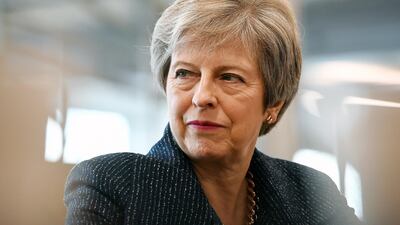If the last seven days have seen torrid twists in the fortunes of Prime Minister Theresa May, the next week is likely to determine if her tenure in Downing Street is best measured in hours or months.
The British prime minster is to spend three days in Brussels negotiating on the country’s deal to leave the European Union. Before that her officials will be locked in talks that are expected to run through the night. She herself has a make or break cabinet meeting on Tuesday at which any one or possibly all of four Brexit rebels could walk out in protest.
It must seem like a lifetime ago when on September 29, Mrs May woke up to the most positive newspaper headlines she had seen since she called an ill-fated general election in June 2017.
The prime minister had just delivered a speech at a Conservative party conference that was at turns self-deprecating and combative, and which suggested she hoped to stay in office beyond March 29, 2019, when Britain leaves the EU.
She had come out swinging against her two greatest opponents, Labour leader Jeremy Corbyn and her former foreign secretary Boris Johnson, and landed palpable hits upon them. Mrs May also laid out economic spending plans that would see Britain leaving the age of austerity next year.
Just a week later, however, Mrs May was back to square one. The front pages of the newspapers spoke of how the Democratic Unionist Party (DUP) on whom she relies for a parliamentary majority were threatening to bring down her administration if she agreed a deal with the EU that left Northern Ireland in the single market, the so-called backstop.
Elsewhere, Mr Johnson popped up on Twitter to decry the proposal as “mak[ing] the UK a permanent EU colony” while fellow Tory MP Mark Pritchard threateningly pointed out that if “a vacancy [for PM] did arise process need not take more than two working weeks - four days in Commons (if needed) and six days with membership - does not need to be an overly long process.”
Talk is already turning to the 48 letters of no-confidence that Conservative MPs would need to lodge with the party hierarchy to trigger a leadership challenge.
“I don’t think there’s a real threat at this point,” James Forsyth of The Spectator magazine wrote. “There is more of a threat that I think Downing Street expected [right after the conference] ... The government seems in a proper crisis.”
_______________
Read more:
As EU divorce nears, UK's 'Project Fear' alarmists may be on the right track
Theresa May warned Brexit could collapse her government
UK Brexit minister ‘confident’ of an autumn deal
_______________
The prime minister ended this week briefing her cabinet in select groups about where the negotiations with the EU are going on the backstop – which would also see the UK remain in the customs union, but not the single market, possibly into 2021 or even 2022. This position is deemed untenable by pro-Brexiteers serving as senior ministers.
According to Mr Forsyth, when the proposals are presented to the full cabinet on Tuesday next week, “the expectation in Westminster is that there will be one or two [cabinet] resignations over the further concessions Mrs May wants to make on the backstop.”
With the prime minister set to fly out to Brussels on Wednesday for three days of crucial talks with fellow EU leaders, intended to thrash out the Northern Ireland situation, Mrs May will also face her weekly Commons showdown with Mr Corbyn at Prime Minister’s Questions.
The Labour leader has begun to enjoy success in these encounters in recent months, and with a backdrop of ministers quitting and political chaos, a strong performance here could send her off to Belgium with even loyalist MPs beginning to question her continued survival.
And things could yet get even worse for Mrs May, as the DUP – whose ten MPs vote with the government following a confidence-and-supply agreement reached after the June 2017 election – has begun to flex its muscles over the issue.
Sammy Wilson, the DUP’s Brexit spokesman, warned the prime minister in a no-holds barred column in the Daily Telegraph that “if the government decides in the face of EU belligerence to cut and run and leave part of the UK languishing in the stifling embrace of the EU, then that would be totally unacceptable to us and many others in the House of Commons.”
This barely-concealed threat brought anger from some quarters of the Conservatives, with pro-Remain MP Heidi Allen reminding Mr Wilson that the DUP had been bought off with £1 billion of public spending to achieve the deal between the parties.
The prime minister will have to decide whether she will call the DUP’s bluff and force through a deal on the backstop. The calculation in No 10 is that the Northern Irish party won’t be able to stomach the concept of a government which has Mr Corbyn at the head of it, due to the Labour leader’s long-standing links with the Irish republican community.
However, the party could find the prospect of being split from the mainland – for the very ‘union’ enshrined in their name – too much to accept, and thus vote down Mrs May.
If the prime minister thinks she has seen a startling change in fortunes over the last week, arguably the next one could prove to be the most politically charged of her 27 months in Downing Street – and perhaps even her last.

